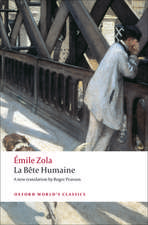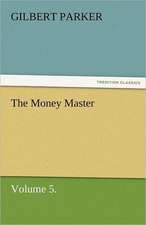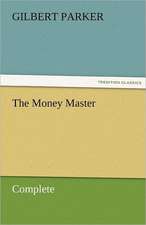The Shadow-Line: A Confession
Autor Joseph Conraden Limba Engleză Paperback – 16 mai 2018
For more than seventy years, Penguin has been the leading publisher of classic literature in the English-speaking world. With more than 1,700 titles, Penguin Classics represents a global bookshelf of the best works throughout history and across genres and disciplines. Readers trust the series to provide authoritative texts enhanced by introductions and notes by distinguished scholars and contemporary authors, as well as up-to-date translations by award-winning translators.
| Toate formatele și edițiile | Preț | Express |
|---|---|---|
| Paperback (8) | 38.04 lei 22-36 zile | |
| Mint Editions – 30 noi 2020 | 38.04 lei 22-36 zile | |
| Penguin Books – 26 sep 1990 | 46.47 lei 25-31 zile | +14.89 lei 5-11 zile |
| Oxford University Press – 26 mar 2009 | 46.73 lei 10-16 zile | +15.31 lei 5-11 zile |
| CREATESPACE – | 52.93 lei 22-36 zile | |
| Portmay Press – 24 iul 2023 | 84.48 lei 22-36 zile | |
| Vintage Books USA – 30 sep 2007 | 86.69 lei 22-36 zile | |
| – | 66.56 lei 43-57 zile | |
| LIGHTNING SOURCE INC – 16 mai 2018 | 125.80 lei 17-23 zile | |
| Hardback (1) | 62.19 lei 22-36 zile | |
| Mint Editions – 7 dec 2020 | 62.19 lei 22-36 zile |
Preț: 125.80 lei
Nou
Puncte Express: 189
Preț estimativ în valută:
24.08€ • 24.77$ • 19.98£
24.08€ • 24.77$ • 19.98£
Comandă specială
Livrare economică 22-28 ianuarie
Preluare comenzi: 021 569.72.76
Specificații
ISBN-13: 9780649161669
ISBN-10: 0649161661
Pagini: 262
Dimensiuni: 159 x 236 x 17 mm
Greutate: 0.41 kg
Editura: LIGHTNING SOURCE INC
ISBN-10: 0649161661
Pagini: 262
Dimensiuni: 159 x 236 x 17 mm
Greutate: 0.41 kg
Editura: LIGHTNING SOURCE INC
Notă biografică
Nascido Józef Teodor Konrad Korzeniowski (Joseph Conrad) na cidade de Berdychiv, atualmente Ucrânia, a 3 de dezembro 1857 e falecido a 3 de agosto de 1924. A cidade era na época parte do Império Russo dos Czares convencionada como a Polónia-Russa, tendo sido anteriormente território polaco. Os seus pais eram nascidos da nobreza polaca, pelo que Conrad é habitualmente considerado um escritor polaco-inglês (e não ucraniano) por essa ascendência e pela aquisição da cidadania britânica em 1886, tendo-se radicado em Inglaterra em 1894 onde iniciou a sua carreira de escrita literária. Orfão de pai e mãe aos 11 anos, Conrad foi a partir daí criado por uns tios, mais tarde e ainda na sua juventude lançou-se à aventura da vida alistando-se na marinha mercante, o que lhe proporcionou múltiplas viagens aventurosas e um extraordinário conhecimento e paixão pelo mar que podemos ver refletidos em diversas das suas histórias como em duas das mais famosas obras da sua autoria: Lord Jim (1900) e Heart of Darkness (1902); o primeiro adaptado ao cinema por Richard Brooks no filme de 1965 com o mesmo nome, e o último adaptado ao cinema no filme Apocalypse Now (1979) de Francis Ford Coppola. Conrad acrescentou novas formas de escrita à língua inglesa através do seu multilinguismo, abrindo portas linguísticas à expressão britânica, e com o seu estilo narrativo baseado em personagens anti-heróicas contribuiu para a transição do realismo para o modernismo da escrita inglesa, e não só, tendo influenciado numerosos autores. Viria a falecer em Inglaterra no ano de 1924 em Bishopsbourne (Kent) vítima de enfarte de miocárdio.
Descriere
Descriere de la o altă ediție sau format:
'A sudden passion of anxious impatience rushed through my veins and gave me such a sense of the intensity of existence as I have never felt before or since.'link title to catalogue entry](exact date?)Written in 1915, The Shadow-Line is based upon events and experiences from twenty-seven years earlier to which Conrad returned obsessively in his fiction. A young sea captain's first command brings with it a succession of crises: his sea is becalmed, the crew laid low by fever, and his deranged first mate is convinced that the ship is haunted by the malignant spirit of a previous captain.This is indeed a work full of 'sudden passions', in which Conrad is able to show how the full intensity of existence can be experienced by the man who, in the words of the older Captain Giles, is prepared to 'stand up to his bad luck, to his mistakes, to his conscience'. A subtle and penetrating analysis of the nature of manhood, The Shadow-Line investigates varieties of masculinity and desire in a subtext that counterpoints the tale's seemingly conventional surface. ABOUT THE SERIES: For over 100 years Oxford World's Classics has made available the widest range of literature from around the globe. Each affordable volume reflects Oxford's commitment to scholarship, providing the most accurate text plus a wealth of other valuable features, including expert introductions by leading authorities, helpful notes to clarify the text, up-to-date bibliographies for further study, and much more.
'A sudden passion of anxious impatience rushed through my veins and gave me such a sense of the intensity of existence as I have never felt before or since.'link title to catalogue entry](exact date?)Written in 1915, The Shadow-Line is based upon events and experiences from twenty-seven years earlier to which Conrad returned obsessively in his fiction. A young sea captain's first command brings with it a succession of crises: his sea is becalmed, the crew laid low by fever, and his deranged first mate is convinced that the ship is haunted by the malignant spirit of a previous captain.This is indeed a work full of 'sudden passions', in which Conrad is able to show how the full intensity of existence can be experienced by the man who, in the words of the older Captain Giles, is prepared to 'stand up to his bad luck, to his mistakes, to his conscience'. A subtle and penetrating analysis of the nature of manhood, The Shadow-Line investigates varieties of masculinity and desire in a subtext that counterpoints the tale's seemingly conventional surface. ABOUT THE SERIES: For over 100 years Oxford World's Classics has made available the widest range of literature from around the globe. Each affordable volume reflects Oxford's commitment to scholarship, providing the most accurate text plus a wealth of other valuable features, including expert introductions by leading authorities, helpful notes to clarify the text, up-to-date bibliographies for further study, and much more.
Extras
I
Only the young have such moments. I don't mean the very young. No. The very young have, properly speaking, no moments. It is the privilege of early youth to live in advance of its days in all the beautiful continuity of hope which knows no pauses and no introspection.
One closes behind one the little gate of mere boyishness--and enters an enchanted garden. Its very shades glow with promise. Every turn of the path has its seduction. And it isn't because it is an undiscovered country. One knows well enough that all mankind had streamed that way. It is the charm of universal experience from which one expects an uncommon or personal sensation--a bit of one's own.
One goes on recognising the landmarks of the predecessors, excited, amused, taking the hard luck and the good luck together--the kicks and the halfpence, as the saying is--the picturesque common lot that holds so many possibilities for the deserving or perhaps for the lucky. Yes. One goes on. And the time, too, goes on--till one perceives ahead a shadow-line warning one that the region of early youth, too, must be left behind.
This is the period of life in which such moments of which I have spoken are likely to come. What moments? Why, the moments of boredom, of weariness, of dissatisfaction. Rash moments. I mean moments when the still young are inclined to commit rash actions, such as getting married suddenly or else throwing up a job for no reason.
This is not a marriage story. It wasn't so bad as that with me. My action, rash as it was, had more the character of divorce--almost of desertion. For no reason on which a sensible person could put a finger I threw up my job--chucked my berth--left the ship of which the worst that could be said was that she was a steamship and therefore, perhaps, not entitled to that blind loyalty which . . . However, it's no use trying to put a gloss on what even at the time I myself half suspected to be a caprice.
It was in an Eastern port. She was an Eastern ship, inasmuch as then she belonged to that port. She traded among dark islands on a blue reef-scarred sea, with the Red Ensign over the taffrail and at her masthead a house-flag, also red, but with a green border and with a white crescent in it. For an Arab owned her, and a Syed at that. Hence the green border on the flag. He was the head of a great House of Straits Arabs, but as loyal a subject of the complex British Empire as you could find east of the Suez Canal. World politics did not trouble him at all, but he had a great occult power amongst his own people.
It was all one to us who owned the ship. He had to employ white men in the shipping part of his business, and many of those he so employed had never set eyes on him from the first to the last day. I myself saw him but once, quite accidentally on a wharf--an old, dark little man blind in one eye, in a snowy robe and yellow slippers. He was having his hand severely kissed by a crowd of Malay pilgrims to whom he had done some favour, in the way of food and money. His alms-giving, I have heard, was most extensive, covering almost the whole Archipelago. For isn't it said that "The charitable man is the friend of Allah"?
Excellent (and picturesque) Arab owner, about whom one needed not to trouble one's head, a most excellent Scottish ship--for she was that from the keel up--excellent sea-boat, easy to keep clean, most handy in every way, and if it had not been for her internal propulsion, worthy of any man's love; I cherish to this day a profound respect for her memory. As to the kind of trade she was engaged in and the character of my shipmates, I could not have been happier if I had had the life and the men made to my order by a benevolent Enchanter.
And suddenly I left all this. I left it in that, to us, inconsequential manner in which a bird flies away from a comfortable branch. It was as though all unknowing I had heard a whisper or seen something. Well--perhaps! One day I was perfectly right and the next everything was gone--glamour, flavour, interest, contentment--everything. It was one of these moments, you know. The green sickness of late youth descended on me and carried me off. Carried me off that ship, I mean.
We were only four white men on board, with a large crew of Kalashes and two Malay petty officers. The Captain stared hard as if wondering what ailed me. But he was a sailor, and he, too, had been young at one time. Presently a smile came to lurk under his thick iron-grey moustache, and he observed that, of course, if I felt I must go he couldn't keep me by main force. And it was arranged that I should be paid off the next morning. As I was going out of the chart-room he added suddenly, in a peculiar wistful tone, that he hoped I would find what I was so anxious to go and look for. A soft, cryptic utterance which seemed to reach deeper than any diamond-hard tool could have done. I do believe he understood my case.
But the second engineer attacked me differently. He was a sturdy young Scot, with a smooth face and light eyes. His honest red countenance emerged out of the engine-room companion and then the whole robust man, with shirt sleeves turned up, wiping slowly the massive fore-arms with a lump of cotton-waste. And his light eyes expressed bitter distaste, as though our friendship had turned to ashes. He said weightily: "Oh! Aye! I've been thinking it was about time for you to run away home and get married to some silly girl."
It was tacitly understood in the port that John Nieven was a fierce mysogynist; and the absurd character of the sally convinced me that he meant to be nasty--very nasty--had meant to say the most crushing thing he could think of. My laugh sounded deprecatory. Nobody but a friend could be so angry as that. I became a little crestfallen. Our chief engineer also took a characteristic view of my action, but in a kindlier spirit.
He was young, too, but very thin, and with a mist of fluffy brown beard all round his haggard face. All day long, at sea or in harbour, he could be seen walking hastily up and down the after-deck, wearing an intense, spiritually rapt expression, which was caused by a perpetual consciousness of unpleasant physical sensations in his internal economy. For he was a confirmed dyspeptic. His view of my case was very simple. He said it was nothing but deranged liver. Of course! He suggested I should stay for another trip and meantime dose myself with a certain patent medicine in which his own belief was absolute. "I'll tell you what I'll do. I'll buy you two bottles, out of my own pocket. There. I can't say fairer than that, can I?"
I believe he would have perpetrated the atrocity (or generosity) at the merest sign of weakening on my part. By that time, however, I was more discontented, disgusted, and dogged than ever. The past eighteen months, so full of new and varied experience, appeared a dreary, prosaic waste of days. I felt--how shall I express it?--that there was no truth to be got out of them.
What truth? I should have been hard put to it to explain. Probably, if pressed, I would have burst into tears simply. I was young enough for that.
Next day the Captain and I transacted our business in the Harbour Office. It was a lofty, big, cool, white room, where the screened light of day glowed serenely. Everybody in it--the officials, the public--were in white. Only the heavy polished desks gleamed darkly in a central avenue, and some papers lying on them were blue. Enormous punkahs sent from on high a gentle draught through that immaculate interior and upon our perspiring heads.
The official behind the desk we approached grinned amiably and kept it up till, in answer to his perfunctory question, "Sign off and on again?" my Captain answered, "No! Signing off for good." And then his grin vanished in sudden solemnity. He did not look at me again till he handed me my papers with a sorrowful expression, as if they had been my passports for Hades.
While I was putting them away he murmured some question to the Captain, and I heard the latter answer good-humouredly:
"No. He leaves us to go home."
"Oh!" the other exclaimed, nodding mournfully over my sad condition.
I didn't know him outside the official building, but he leaned forward over the desk to shake hands with me, compassionately, as one would with some poor devil going out to be hanged; and I am afraid I performed my part ungraciously, in the hardened manner of an impenitent criminal.
No homeward-bound mail-boat was due for three or four days. Being now a man without a ship, and having for a time broken my connection with the sea--become, in fact, a mere potential passenger--it would have been more appropriate perhaps if I had gone to stay at a hotel. There it was, too, within a stone's throw of the Harbour Office, low, but somehow palatial, displaying its white, pillared pavilions surrounded by trim grass plots. I would have felt a passenger indeed in there! I gave it a hostile glance and directed my steps towards the Officers' Sailors' Home.
I walked in the sunshine, disregarding it, and in the shade of the big trees on the esplanade without enjoying it. The heat of the tropical East descended through the leafy boughs, enveloping my thinly-clad body, clinging to my rebellious discontent, as if to rob it of its freedom.
The Officers' Home was a large bungalow with a wide verandah and a curiously suburban-looking little garden of bushes and a few trees between it and the street. That institution partook somewhat of the character of a residential club, but with a slightly Governmental flavour about it, because it was administered by the Harbour Office. Its manager was officially styled Chief Steward. He was an unhappy, wizened little man, who if put into a jockey's rig would have looked the part to perfection. But it was obvious that at some time or other in his life, in some capacity or other, he had been connected with the sea. Possibly in the comprehensive capacity of a failure.
I should have thought his employment a very easy one, but he used to affirm for some reason or other that his job would be the death of him some day. It was rather mysterious. Perhaps everything naturally was too much trouble for him. He certainly seemed to hate having people in the house.
On entering it I thought he must be feeling pleased. It was as still as a tomb. I could see no one in the living rooms; and the verandah, too, was empty, except for a man at the far end dozing prone in a long chair. At the noise of my footsteps he opened one horribly fish-like eye. He was a stranger to me. I retreated from there, and, crossing the dining-room--a very bare apartment with a motionless punkah hanging over the centre table--I knocked at a door labelled in black letters: "Chief Steward."
The answer to my knock being a vexed and doleful plaint: "Oh, dear! Oh, dear! What is it now?" I went in at once.
It was a strange room to find in the tropics. Twilight and stuffiness reigned in there. The fellow had hung enormously ample, dusty, cheap lace curtains over his windows, which were shut. Piles of cardboard boxes, such as milliners and dressmakers use in Europe, cumbered the corners; and by some means he had procured for himself the sort of furniture that might have come out of a respectable parlour in the East End of London--a horsehair sofa, arm-chairs of the same. I glimpsed grimy antimacassars scattered over that horrid upholstery, which was awe-inspiring, insomuch that one could not guess what mysterious accident, need, or fancy had collected it there. Its owner had taken off his tunic, and in white trousers and a thin short-sleeved singlet prowled behind the chair-backs nursing his meagre elbows.
An exclamation of dismay escaped him when he heard that I had come for a stay; but he could not deny that there were plenty of vacant rooms.
"Very well. Can you give me the one I had before?"
He emitted a faint moan from behind a pile of cardboard boxes on the table, which might have contained gloves or handkerchiefs or neckties. I wonder what the fellow did keep in them? There was a smell of decaying coral, of oriental dust, of zoological specimens in that den of his. I could only see the top of his head and his unhappy eyes levelled at me over the barrier.
"It's only for a couple of days," I said, intending to cheer him up.
"Perhaps you would like to pay in advance?" he suggested eagerly.
"Certainly not!" I burst out directly I could speak. "Never heard of such a thing! This is the most infernal cheek. . . ."
He had seized his head in both hands--a gesture of despair which checked my indignation.
"Oh, dear! Oh, dear! Don't fly out like this. I am asking everybody."
"I don't believe it," I said bluntly.
"Well, I am going to. And if you gentlemen all agreed to pay in advance I could make Hamilton pay up too. He's always turning up ashore dead broke, and even when he has some money he won't settle his bills. I don't know what to do with him. He swears at me and tells me I can't chuck a white man out into the street here. So if you only would. . . ."
I was amazed. Incredulous too. I suspected the fellow of gratuitous impertinence. I told him with marked emphasis that I would see him and Hamilton hanged first, and requested him to conduct me to my room with no more of his nonsense. He produced then a key from somewhere and led the way out of his lair, giving me a vicious sidelong look in passing.
"Any one I know staying here?" I asked him before he left my room.
He had recovered his usual pained impatient tone, and said that Captain Giles was there, back from a Solo Sea trip. Two other guests were staying also. He paused. And, of course, Hamilton, he added.
"Oh, yes! Hamilton," I said, and the miserable creature took himself off with a final groan.
Only the young have such moments. I don't mean the very young. No. The very young have, properly speaking, no moments. It is the privilege of early youth to live in advance of its days in all the beautiful continuity of hope which knows no pauses and no introspection.
One closes behind one the little gate of mere boyishness--and enters an enchanted garden. Its very shades glow with promise. Every turn of the path has its seduction. And it isn't because it is an undiscovered country. One knows well enough that all mankind had streamed that way. It is the charm of universal experience from which one expects an uncommon or personal sensation--a bit of one's own.
One goes on recognising the landmarks of the predecessors, excited, amused, taking the hard luck and the good luck together--the kicks and the halfpence, as the saying is--the picturesque common lot that holds so many possibilities for the deserving or perhaps for the lucky. Yes. One goes on. And the time, too, goes on--till one perceives ahead a shadow-line warning one that the region of early youth, too, must be left behind.
This is the period of life in which such moments of which I have spoken are likely to come. What moments? Why, the moments of boredom, of weariness, of dissatisfaction. Rash moments. I mean moments when the still young are inclined to commit rash actions, such as getting married suddenly or else throwing up a job for no reason.
This is not a marriage story. It wasn't so bad as that with me. My action, rash as it was, had more the character of divorce--almost of desertion. For no reason on which a sensible person could put a finger I threw up my job--chucked my berth--left the ship of which the worst that could be said was that she was a steamship and therefore, perhaps, not entitled to that blind loyalty which . . . However, it's no use trying to put a gloss on what even at the time I myself half suspected to be a caprice.
It was in an Eastern port. She was an Eastern ship, inasmuch as then she belonged to that port. She traded among dark islands on a blue reef-scarred sea, with the Red Ensign over the taffrail and at her masthead a house-flag, also red, but with a green border and with a white crescent in it. For an Arab owned her, and a Syed at that. Hence the green border on the flag. He was the head of a great House of Straits Arabs, but as loyal a subject of the complex British Empire as you could find east of the Suez Canal. World politics did not trouble him at all, but he had a great occult power amongst his own people.
It was all one to us who owned the ship. He had to employ white men in the shipping part of his business, and many of those he so employed had never set eyes on him from the first to the last day. I myself saw him but once, quite accidentally on a wharf--an old, dark little man blind in one eye, in a snowy robe and yellow slippers. He was having his hand severely kissed by a crowd of Malay pilgrims to whom he had done some favour, in the way of food and money. His alms-giving, I have heard, was most extensive, covering almost the whole Archipelago. For isn't it said that "The charitable man is the friend of Allah"?
Excellent (and picturesque) Arab owner, about whom one needed not to trouble one's head, a most excellent Scottish ship--for she was that from the keel up--excellent sea-boat, easy to keep clean, most handy in every way, and if it had not been for her internal propulsion, worthy of any man's love; I cherish to this day a profound respect for her memory. As to the kind of trade she was engaged in and the character of my shipmates, I could not have been happier if I had had the life and the men made to my order by a benevolent Enchanter.
And suddenly I left all this. I left it in that, to us, inconsequential manner in which a bird flies away from a comfortable branch. It was as though all unknowing I had heard a whisper or seen something. Well--perhaps! One day I was perfectly right and the next everything was gone--glamour, flavour, interest, contentment--everything. It was one of these moments, you know. The green sickness of late youth descended on me and carried me off. Carried me off that ship, I mean.
We were only four white men on board, with a large crew of Kalashes and two Malay petty officers. The Captain stared hard as if wondering what ailed me. But he was a sailor, and he, too, had been young at one time. Presently a smile came to lurk under his thick iron-grey moustache, and he observed that, of course, if I felt I must go he couldn't keep me by main force. And it was arranged that I should be paid off the next morning. As I was going out of the chart-room he added suddenly, in a peculiar wistful tone, that he hoped I would find what I was so anxious to go and look for. A soft, cryptic utterance which seemed to reach deeper than any diamond-hard tool could have done. I do believe he understood my case.
But the second engineer attacked me differently. He was a sturdy young Scot, with a smooth face and light eyes. His honest red countenance emerged out of the engine-room companion and then the whole robust man, with shirt sleeves turned up, wiping slowly the massive fore-arms with a lump of cotton-waste. And his light eyes expressed bitter distaste, as though our friendship had turned to ashes. He said weightily: "Oh! Aye! I've been thinking it was about time for you to run away home and get married to some silly girl."
It was tacitly understood in the port that John Nieven was a fierce mysogynist; and the absurd character of the sally convinced me that he meant to be nasty--very nasty--had meant to say the most crushing thing he could think of. My laugh sounded deprecatory. Nobody but a friend could be so angry as that. I became a little crestfallen. Our chief engineer also took a characteristic view of my action, but in a kindlier spirit.
He was young, too, but very thin, and with a mist of fluffy brown beard all round his haggard face. All day long, at sea or in harbour, he could be seen walking hastily up and down the after-deck, wearing an intense, spiritually rapt expression, which was caused by a perpetual consciousness of unpleasant physical sensations in his internal economy. For he was a confirmed dyspeptic. His view of my case was very simple. He said it was nothing but deranged liver. Of course! He suggested I should stay for another trip and meantime dose myself with a certain patent medicine in which his own belief was absolute. "I'll tell you what I'll do. I'll buy you two bottles, out of my own pocket. There. I can't say fairer than that, can I?"
I believe he would have perpetrated the atrocity (or generosity) at the merest sign of weakening on my part. By that time, however, I was more discontented, disgusted, and dogged than ever. The past eighteen months, so full of new and varied experience, appeared a dreary, prosaic waste of days. I felt--how shall I express it?--that there was no truth to be got out of them.
What truth? I should have been hard put to it to explain. Probably, if pressed, I would have burst into tears simply. I was young enough for that.
Next day the Captain and I transacted our business in the Harbour Office. It was a lofty, big, cool, white room, where the screened light of day glowed serenely. Everybody in it--the officials, the public--were in white. Only the heavy polished desks gleamed darkly in a central avenue, and some papers lying on them were blue. Enormous punkahs sent from on high a gentle draught through that immaculate interior and upon our perspiring heads.
The official behind the desk we approached grinned amiably and kept it up till, in answer to his perfunctory question, "Sign off and on again?" my Captain answered, "No! Signing off for good." And then his grin vanished in sudden solemnity. He did not look at me again till he handed me my papers with a sorrowful expression, as if they had been my passports for Hades.
While I was putting them away he murmured some question to the Captain, and I heard the latter answer good-humouredly:
"No. He leaves us to go home."
"Oh!" the other exclaimed, nodding mournfully over my sad condition.
I didn't know him outside the official building, but he leaned forward over the desk to shake hands with me, compassionately, as one would with some poor devil going out to be hanged; and I am afraid I performed my part ungraciously, in the hardened manner of an impenitent criminal.
No homeward-bound mail-boat was due for three or four days. Being now a man without a ship, and having for a time broken my connection with the sea--become, in fact, a mere potential passenger--it would have been more appropriate perhaps if I had gone to stay at a hotel. There it was, too, within a stone's throw of the Harbour Office, low, but somehow palatial, displaying its white, pillared pavilions surrounded by trim grass plots. I would have felt a passenger indeed in there! I gave it a hostile glance and directed my steps towards the Officers' Sailors' Home.
I walked in the sunshine, disregarding it, and in the shade of the big trees on the esplanade without enjoying it. The heat of the tropical East descended through the leafy boughs, enveloping my thinly-clad body, clinging to my rebellious discontent, as if to rob it of its freedom.
The Officers' Home was a large bungalow with a wide verandah and a curiously suburban-looking little garden of bushes and a few trees between it and the street. That institution partook somewhat of the character of a residential club, but with a slightly Governmental flavour about it, because it was administered by the Harbour Office. Its manager was officially styled Chief Steward. He was an unhappy, wizened little man, who if put into a jockey's rig would have looked the part to perfection. But it was obvious that at some time or other in his life, in some capacity or other, he had been connected with the sea. Possibly in the comprehensive capacity of a failure.
I should have thought his employment a very easy one, but he used to affirm for some reason or other that his job would be the death of him some day. It was rather mysterious. Perhaps everything naturally was too much trouble for him. He certainly seemed to hate having people in the house.
On entering it I thought he must be feeling pleased. It was as still as a tomb. I could see no one in the living rooms; and the verandah, too, was empty, except for a man at the far end dozing prone in a long chair. At the noise of my footsteps he opened one horribly fish-like eye. He was a stranger to me. I retreated from there, and, crossing the dining-room--a very bare apartment with a motionless punkah hanging over the centre table--I knocked at a door labelled in black letters: "Chief Steward."
The answer to my knock being a vexed and doleful plaint: "Oh, dear! Oh, dear! What is it now?" I went in at once.
It was a strange room to find in the tropics. Twilight and stuffiness reigned in there. The fellow had hung enormously ample, dusty, cheap lace curtains over his windows, which were shut. Piles of cardboard boxes, such as milliners and dressmakers use in Europe, cumbered the corners; and by some means he had procured for himself the sort of furniture that might have come out of a respectable parlour in the East End of London--a horsehair sofa, arm-chairs of the same. I glimpsed grimy antimacassars scattered over that horrid upholstery, which was awe-inspiring, insomuch that one could not guess what mysterious accident, need, or fancy had collected it there. Its owner had taken off his tunic, and in white trousers and a thin short-sleeved singlet prowled behind the chair-backs nursing his meagre elbows.
An exclamation of dismay escaped him when he heard that I had come for a stay; but he could not deny that there were plenty of vacant rooms.
"Very well. Can you give me the one I had before?"
He emitted a faint moan from behind a pile of cardboard boxes on the table, which might have contained gloves or handkerchiefs or neckties. I wonder what the fellow did keep in them? There was a smell of decaying coral, of oriental dust, of zoological specimens in that den of his. I could only see the top of his head and his unhappy eyes levelled at me over the barrier.
"It's only for a couple of days," I said, intending to cheer him up.
"Perhaps you would like to pay in advance?" he suggested eagerly.
"Certainly not!" I burst out directly I could speak. "Never heard of such a thing! This is the most infernal cheek. . . ."
He had seized his head in both hands--a gesture of despair which checked my indignation.
"Oh, dear! Oh, dear! Don't fly out like this. I am asking everybody."
"I don't believe it," I said bluntly.
"Well, I am going to. And if you gentlemen all agreed to pay in advance I could make Hamilton pay up too. He's always turning up ashore dead broke, and even when he has some money he won't settle his bills. I don't know what to do with him. He swears at me and tells me I can't chuck a white man out into the street here. So if you only would. . . ."
I was amazed. Incredulous too. I suspected the fellow of gratuitous impertinence. I told him with marked emphasis that I would see him and Hamilton hanged first, and requested him to conduct me to my room with no more of his nonsense. He produced then a key from somewhere and led the way out of his lair, giving me a vicious sidelong look in passing.
"Any one I know staying here?" I asked him before he left my room.
He had recovered his usual pained impatient tone, and said that Captain Giles was there, back from a Solo Sea trip. Two other guests were staying also. He paused. And, of course, Hamilton, he added.
"Oh, yes! Hamilton," I said, and the miserable creature took himself off with a final groan.



























